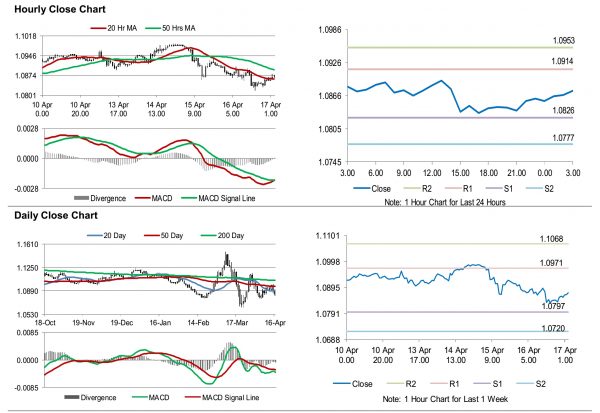For the 24 hours to 23:00 GMT, the EUR declined 0.39% against the USD and closed at 1.0860.
On the macro front, Euro-zone’s seasonally adjusted industrial production dropped 0.1% on a monthly basis in February, less than market forecast for a drop of 0.2% and compared to a rise of 2.3% in the prior month. Separately, Germany’s consumer price inflation slowed to 1.4% on a yearly basis in March, recording its lowest level in four months and compared to a level of 1.7% in the previous month. The preliminary figures had indicated a level of 1.4%.
In the US, housing starts plunged 22.3% to an annual rate of 1.22 million in March, amid steep drop in both single-family and multi-family starts and more than market forecast for a drop of 17.7%. In the prior month, housing starts had recorded a revised reading of 1.56 million. Additionally, building permits slid 6.8% to an annual rate of 1.35mn in March, compared to a revised level of 1.45 million in the previous month. Moreover, the Philadelphia Fed manufacturing survey slumped to a level of -56.6 in April, marking its lowest level since July 1980 and more than market expectations for a fall to a level of -30.0. In the previous month, the manufacturing index had recorded a level of -12.7. Furthermore, initial jobless claims tumbled to 5245.0K in the week ended 10 April 2020, less than market forecast and compared to a revised level of 6615.0K in the previous week.
In the Asian session, at GMT0300, the pair is trading at 1.0874, with the EUR trading 0.13% higher against the USD from yesterday’s close.
The pair is expected to find support at 1.0826, and a fall through could take it to the next support level of 1.0777. The pair is expected to find its first resistance at 1.0914, and a rise through could take it to the next resistance level of 1.0953.
Looking forward, traders would keep an eye on Euro-zone’s consumer price index for March and construction output for February, slated to release in a few hours.
The currency pair is trading between with its 20 Hr and 50 Hr moving averages.

